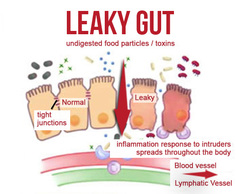Health Issues Stemming from a Leaky Gut
- fatigue
- slow metabolism
- nutrient deficiency (like iron, vitamin B12)
- thyroid conditions
- eczema
- allergies
- joint pain/arthritis
- bloating
- hives
- brain fog
- acne and rosacea
- migraines
- IBS
- psoriasis
- autoimmune conditions
How does this happen?
It doesn't occur overnight, but the progression of improper digestion may sneak up on you since the signs are easy to ignore. The cells that line your gut are meant to be tight together and act as a barrier blocking bacteria, toxic waste, undigested food proteins, and anything else that might be in your digestive tract, from passing through into the blood or lymphatic system. Ideally, your intestinal lining should act like a net, allowing water and nutrients to pass through, while blocking larger items from entering the body.
The reasons the cells spring a leak, allowing unwanted stuff into the body, could be many but here's a list of possibilities:
- antibiotics
- infections
- blood sugar imbalance
- low stomach acid or digestive enzymes
- stress
- medications
- yeast/fungi or bacterial overgrowth
- hormone imbalance
- toxins
- constipation
- food sensitivities
- eating too many inflammatory foods (gluten, dairy, sugar, alcohol, GMOs)
How does a Leaky Gut cause disease?
Whenever anything enters the blood or lymphatic system that isn't supposed to be there, the immune system will attack it. Just as it's designed to fight any virus or bacteria that you might breathe in on a daily basis, the immune system will try to fight off any foreign invader to protect you.
The trouble is, when the gut is leaky, the immune system is constantly being exposed to and attacks food proteins, toxins, or other particles that shouldn't be there in the first place. This leads to chronic inflammation in the body, and results in any large number of health conditions or symptoms listed above.
How will we heal it?
1. Remove
Take any food triggers, sensitivities or inflammatory foods out of the diet. Some of the foods may be reintroduced in smaller amounts after healing has occurred. We can find out your specific food triggers through an Elimination Diet or by doing an IgG food sensitivity blood test.
2. Replace
Saturate your body with delicious and nutritious healing foods like bone broth soups, coconut oil, fruits and vegetables, and sauerkraut or kimchi. Within a couple of weeks you should no longer be craving unhealthy foods, and your energy will have increased dramatically. Any pain you may have experienced should also be reduced within that timeframe.
3. Repair
In order to repair the damage, or speed up the healing, individualized treatments like herbal remedies, acupuncture, or supplements can be used. My favourites are digestive enzymes, quercetin and L-glutamine to help the gut relearn its job and heal, plus licorice root and aswhaghanda if stress or the thyroid are implicated.
4. Rebalance
The neat thing about the gut is that it's not just the complex system of cells and enzymes that digest food, but there's also good bacteria that help us to breakdown food and absorb nutrients, keeping our digestion working at its best. Once we've repaired the digestive tract, it's time to repopulate it with these good bacteria, especially to help crowd out the bad bugs. The bacterial balance in the gut is affected by external factors like antibiotics, but also the foods we eat can cause certain types of bacteria to thrive over others. Having the right ratios and balance of bacteria can be supported with probiotics and fermented foods, a higher dose is typically suggested initially.
I hope I've helped bring some clarity over this popular yet confusing topic, plus given you some insights as to why it's important to heal your digestive system and change your eating habits as part of your treatment plan.
Enjoy the summer weather! :)
Dr. Christa

 RSS Feed
RSS Feed